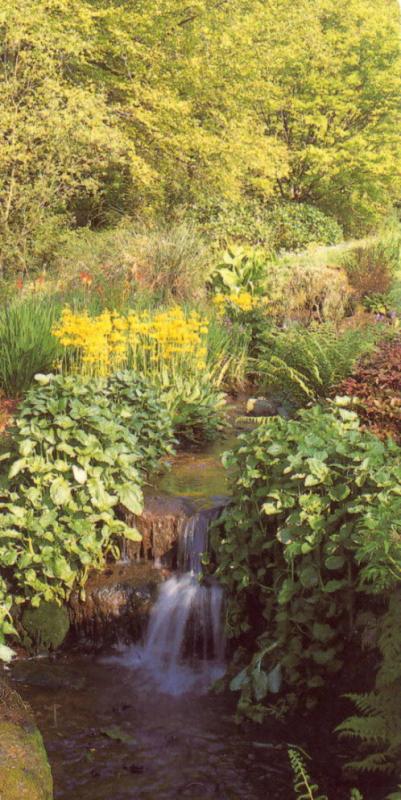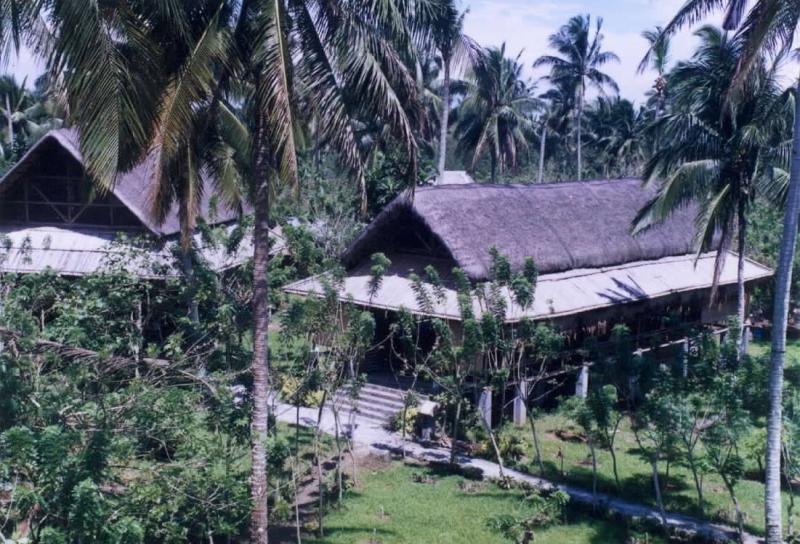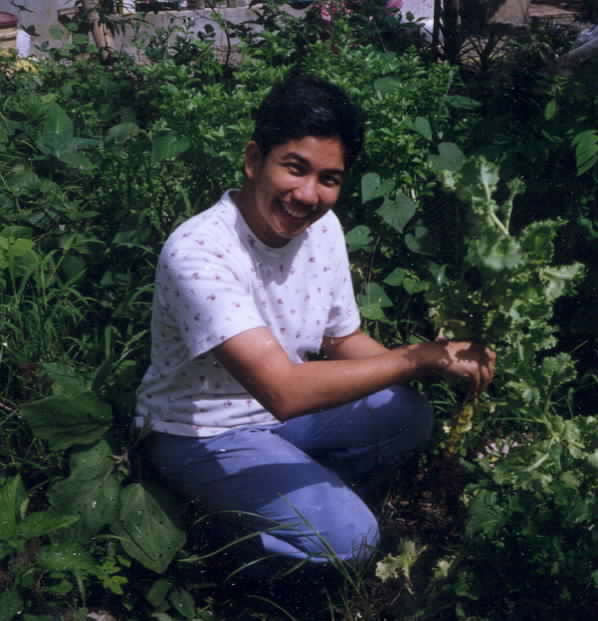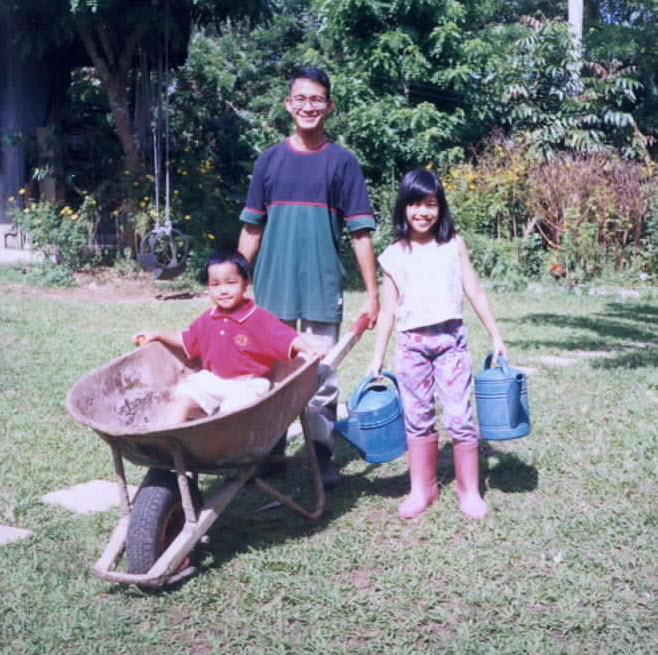Lest The World Become A Desert
By Kris Mina
Malate Church and parish community is in the heart of Manila. It is aware of the growing catastrophe being caused by the destruction of the environment all over the Philippines and all over the world. Part of its response is to set up the farming community called Center for Ecozoic Living and Learning (CELL), an hour’s drive from Manila. There in Cavite, Kris and Roberto Mina have done something wonderful to our eyes – they have created a beautiful world which the parishioners and diverse visitors are invited to experience and learn from. Below, Kris tells us about this extraordinary experiment in promoting God’s Kingdom in a novel and vital way.

We are into organic farming, but we do more than just farming. Our family lives and works in an ecological spirituality center, my husband Roberto and I being staff members. We are on land not our own, with an area of 1.2 hectares, a quarter of which is devoted to receiving visitors who stay for a day or overnight. They usually ask at the beginning of their stay, “Where is the farm?” They look for vast rice fields and rows of vegetables and cash crops, and we have nothing much of that. The kind of farming we do is PERMACULTURE, which encourages food to be grown and forest, animals and flowers.
Permaculture
Permaculture tries to answer such questions as “How do I live and grow food without killing the soil, the air and the water? How can I farm and at the same time make the soil richer, and ensure that it will continue producing food for a long time? Can I do farming that doesn’t only feed the body but also the soul?” Permaculture means that the kind of agriculture we do is permanent, and the kind of culture we foster is long lasting.
Present day agricultural practices, while producing impressive yields in the short-term, lead to environmental disaster. Farming is no longer about bonding with the soil, learning from nature and celebrating nature’s ways. People are no longer at home with their real home which is nature.

Ways of nature
In permaculture, we watch nature and learn from its ways. A forest offers the richest lessons. We devote 3/5 of the farm to growing a forest with a variety of native trees. 1,200 trees are now planted and serve as the habitat for all kinds of insects. With insects present, birds, frogs, lizards and spiders come, and so do other creatures such as snakes, which like to eat them.
Maintaining the food web
We have a pond that catches the rain, so that all these creatures have a drinking station and breeding place. At night some of them visit our vegetable patches and feed off the insects that attack our vegetables. There is no need for pesticides. We plant flowers alongside vegetables to control pests and weeds. We breed honeybees in the orchard to help in pollination, aside from being able to harvest their surplus of honey in the summer.
Our chickens range freely, and when we do put them in cages, they are in movable ones placed on the ground. The chickens are happy enough to do the weeding and manicuring, turning grass patches into ready garden beds.

Waste Management
We are also happy with how we manage the waste generated by our living and working on the farm. Take for instance waste matter. All our sinks, laundry and shower areas are fitted with pipes that lead to the flower gardens. We are able to use the water again because we use only biodegradeable soaps, not detergents and disinfectants.
Human waste is another example. All our toilets are connected to the biogas digester, which, unlike the usual septic tank, separates the poo from the pee. The poo becomes fertilizer, the methane gas coming out of it serving as fuel for a stove. The pee is filtered and used to water our young trees.

Responsible disposal
On the farm, you can do ordinary things with a smile: wash your hands and know that you are helping flowers bloom, use the toilet and make a forest grow.
As to the regular household trash, we separate the biodegradeables from the non-biodegradeables. Biodegradeables are the ones that eventually rot. Food scraps go to the dogs and chickens, peelings and wet paper are fed to the compost worms to be converted into vermicast fertilizer; and bones and shells are buried to be forgotten – and in time become fertilizer.
Non-biodegradeables are a challenge
Most non-biodegradeables are made of plastic. Until two years ago, we would lump them all together and wait for the garbage collector. Well, nearly three years ago the large dumps in Manila where poor families scavenge for junk collapsed from heavy rains and buried their shanties, killing 200 people. Talk about your candy wrapper committing mass murder! We said we didn’t want to participate in that kind of killing anymore. What then could we do?
We didn’t feel good sending them off to the dumpsites. And we didn’t feel good in burying them either. We know that a thousand years from now, when we’re long dead, those plastics will still be there, giving problems to the soil and all creatures living in it. We didn’t feel good burning them. We know that dioxin comes out of burnt plastics and it’s toxic for all animals to breathe in.
And so we wash our plastics – torn grocery bags, food wrappers, packaging of all kinds – dry them and keep them. Do we love them? Not at all! We’re just waiting for brilliant minds to find ways to use them safely. In the meantime, as they are clean and not a bit smelly, we keep them in cabinets and throw-pillows. Since we know that all plastics will stay with us, we have become choosy with what we buy, knowing that we are directly responsible for our choices and actions.
Spiritual response
And so we do more than farming. We see farming as a spiritual response. People in search of solutions to the ecological crisis. We know in our hearts that the ecological crisis is a crisis of LIFE. It is about death. We are awakened to the horrendous situation that the planet is in. To respond to the ecological crisis is to choose life and to participate in God’s mission to be life for the planet.
We humans seem to have lost our way. It is the activity of our species, one among 12 million, that is the main reason for the extinction of about 100 species a day. We say we love the Creator, but destroy his creation. The inspiration to do permaculture comes from having listened to the New Story of Creation.
This story is about how the Universe evolved very slowly to become host to our planet and all of life. Visitors to our farm get a chance to listen to the story. We all reach an insight that care for the earth is authentic when people abandon the idea of human superiority over all God’s creation. We are not the masters of creation. Each creature is a loving expression of LIFE and is entitled to live on this planet as humans do.
Belonging to the Earth
We need to know who we really are. We need to understand that if a loving, compassionate God waited to place us in the universe 15 billion years after the Big Bang, it was not because we were meant to undo what creation had laboured to achieve. All creatures around us are much older than humans. But we were the ones granted the heart and mind to give them their names, to understand how we all relate to each other, and to continue the work of creation.
So at the farm, we invite our visitors to look closely, listen, touch, smell and taste as they go for a nature walk. We invite them to help a bit in the farm, to do earth care work. When they get soil on their hands, we hope that something in their hearts remembers that they belong to the earth. When they appreciate the different creatures, we hope that they would allow the Earth to be a mother that teaches her children her ways. We would like to see the day when all six billion people on earth wake up to their role as an ally of the planet, not its destroyer.
Nature is my home
One college girl, 17-year-old, an urban dweller all her life, wrote this poem after staying a day with us:
I felt the cool wind on my face, skin,
Ruffling my hair.
I felt lighter, maybe lighter than I had ever been.
I forgot about the heat of the sun against my skin
And actually loved the way it felt.
I felt the earth, the soft earth caressing my fingers
And how amazing it felt on my palms.
Somehow during this day I felt I’d come home
To where I came from.
And then I realized I am home here in nature.
Nature is my home.
I guess the farm is bearing all kinds of fruits.
CELL is an NGO founded in 1999 by Columbans John Leydon, Frank Carey and Dom Nolan, together with a Filipino landowner, Elin Mondejar. It is partly funded by contributions from Ireland. Email:cell@info.com.ph